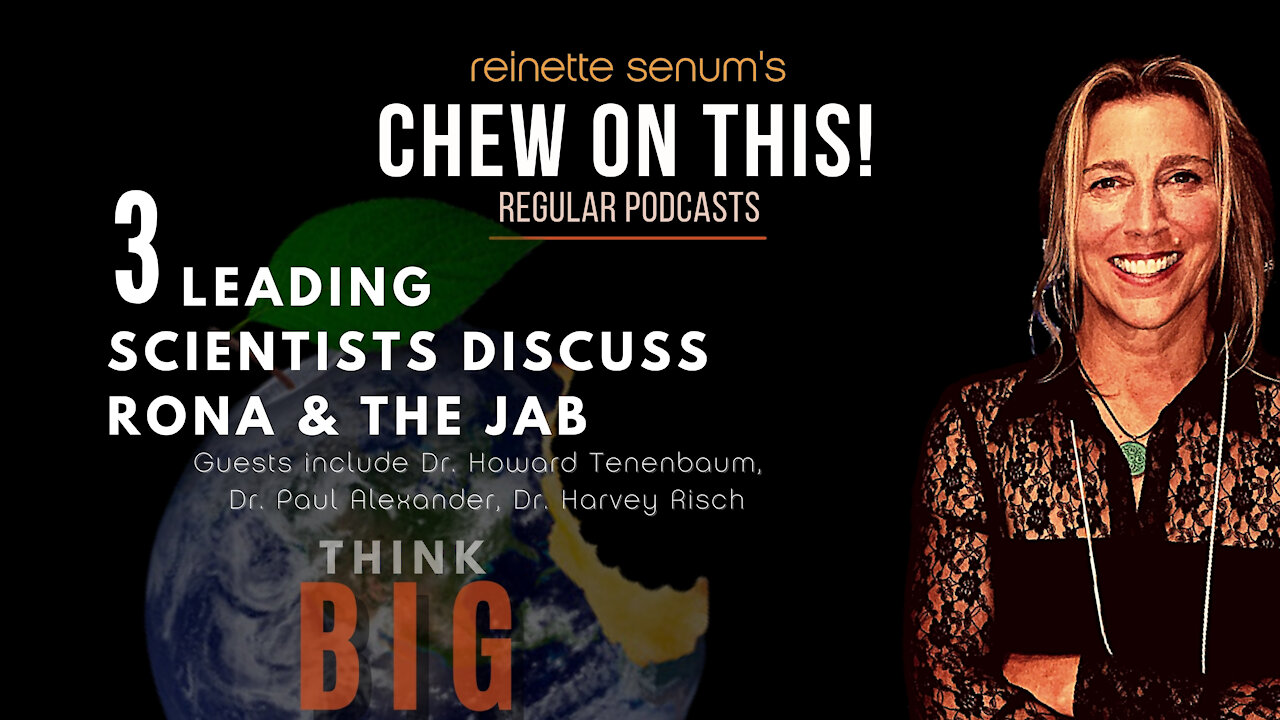Premium Only Content

3 LEADING SCIENTISTS DISCUSS "RONA" & THE JAB
Join Chew On This! host, Reinette Senum, as she discusses Rona and The Jab with 3 leading scientists, Dr. Paul Alexander, Dr. Harvey Risch, and Dr. Howard Tenenbaum. Dive into the most recent empirical data, risks, understandings, and what we now know regarding Rona, the Jab, and Impacts on Our Children.
Paul Alexander
Paul E. Alexander received his bachelor’s degree in epidemiology from McMaster University in Hamilton, Ontario, a master’s degree from Oxford University, and a PhD from McMaster University’s Department of Health Research Methods, Evidence, and Impact.
Harvey Risch
Dr. Harvey Risch is Professor of Epidemiology in the Department of Epidemiology and Public Health at Yale School of Medicine. He received his MD degree from the University of California San Diego and PhD from the University of Chicago. Dr. Risch is Associate Editor of the Journal of the National Cancer Institute, Editor of the International Journal of Cancer, and was for six years a Member of the Board of Editors, the American Journal of Epidemiology. He is an author of more than 350 original peer-reviewed research publications in the medical literature and those research papers have been cited by other scientific publications more than 44,000 times. Dr. Risch has an h-index of 94 and is a Member of the Connecticut Academy of Sciences and Engineering.
Howard Tenenbaum
Dr. Tenenbaum received his D.D.S. from the University of Toronto in 1978 and then completed his specialty in Periodontology as well as a Ph.D. in bone cell biology by 1982. This was followed by a two-year postdoctoral MRC fellowship in Bethesda at the National Institutes of Health.Dr. Tenebaum’s research explores a wide range of topics encompassing both oral and systemic health, including exploring links between periodontitis and other inflammatory diseases such as cardiovascular diseases, the effects of smoking on periodontitis, and topics related to bone cancer. Tenenbaum, a periodontist based at the University of Toronto with a PhD in cell biology, added early on in the pandemic, they knew that an antibiotic called doxycycline could be a “very effective agent” to inhibit enzymes and the hyper inflammation that destroys lung tissue after COVID gets a hold of a patient.
-
 LIVE
LIVE
Inverted World Live
2 hours agoMake Crop Circles Great Again | Ep. 64
7,035 watching -
 LIVE
LIVE
TimcastIRL
2 hours agoIRAN STRIKE FAILED Claims LEAKED Intel Report, Trump Admin DENIES Report | Timcast IRL
10,760 watching -
 2:20:41
2:20:41
Barry Cunningham
3 hours agoPRESIDENT TRUMP FACES THE WRATH OF THE DEEP STATE AND MORE NEWS!
29.7K47 -
 LIVE
LIVE
Man in America
6 hours agoThe Banking Cartel NEEDS WW3—Can a Ceasefire Derail the Reset? w/ Collin Plume
854 watching -
 LIVE
LIVE
SpartakusLIVE
4 hours agoDuos w/ Rallied || The Spartan and The Dragon DOMINATE the Tower of Power
455 watching -
 LIVE
LIVE
Adam Does Movies
4 hours agoTalking Movies + Ask Me Anything - LIVE
176 watching -
 29:54
29:54
Producer Michael
9 hours agoThe Art Of Layering Luxury Fragrances
441 -
 LIVE
LIVE
Anthony Rogers
21 hours agoEpisode 373 - Darkside of the Smokey Mountains
172 watching -
 LIVE
LIVE
AlaskanBallistics
7 hours agoShooting the Wyoming Arms .22lr Suppressor Live!
122 watching -
 1:24:38
1:24:38
Glenn Greenwald
5 hours agoProf. John Mearsheimer on U.S./Israeli War with Iran, Gaza, Trump's Foreign Policy, and More | SYSTEM UPDATE #475
78.4K51